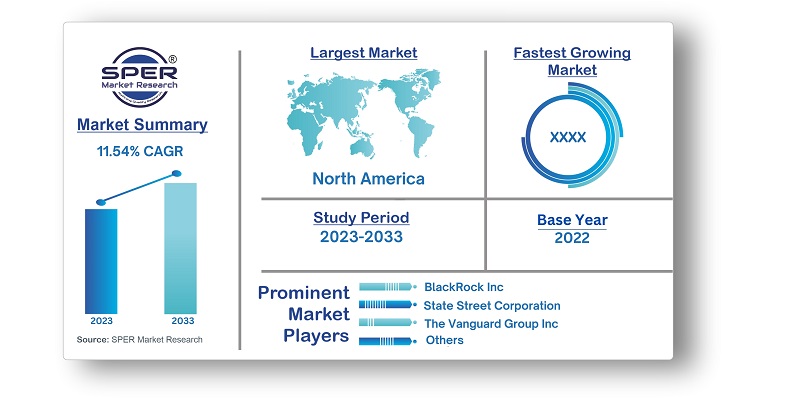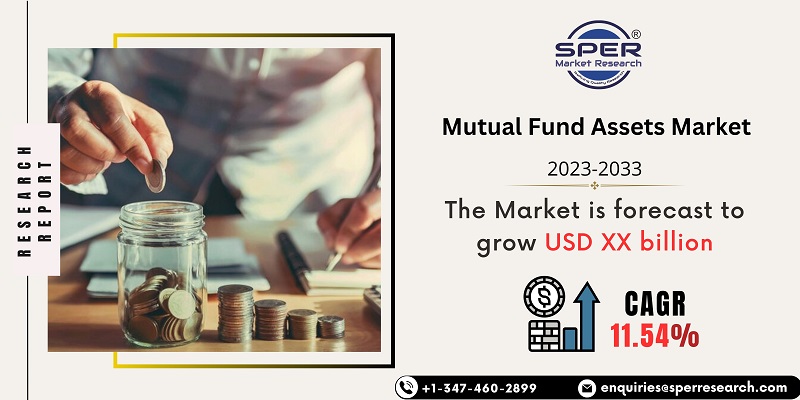
Mutual Fund Assets Market Growth, Size, Trends, Demand, Revenue, Challenges and Future Outlook
Mutual Fund Assets Market Size- By Fund Type, By Distribution Channel, By Investor Type- Regional Outlook, Competitive Strategies and Segment Forecast to 2033
| Published: Jul-2023 | Report ID: BFSI2324 | Pages: 1 - 244 | Formats*: |
| Category : BFSI | |||
- Investor Education and Awareness: As investors gain a better understanding of the benefits and potential returns given by mutual funds, they are more likely to invest in them. Education campaigns, financial literacy programs, and better access to mutual fund information all contribute to increased mutual fund asset growth.
- Economic Growth: In general, positive economic conditions, such as increasing GDP growth, low inflation, and low interest rates, lead to increased demand for mutual funds. As economies grow, investors have more discretionary income with which to invest and seek chances for wealth growth.


| Report Metric | Details |
| Market size available for years | 2019-2033 |
| Base year considered | 2022 |
| Forecast period | 2023-2033 |
| Segments covered | By Fund Type, By Distribution Channel, By Investor Type |
| Regions covered | Asia-Pacific, Europe, Middle East and Africa, North America, Latin America |
| Companies Covered | BlackRock Inc, State Street Corporation, The Vanguard Group Inc, BNP Paribas Mutual Fund, Capital Group, Citigroup Inc, Goldman Sachs, JPMorgan Stanley, Morgan Stanley, PIMCO. |
- Individual Investors
- Institutional Investors
- Banks and Financial Institutions
| By Fund Type: |
|
| By Distribution Channel: |
|
| By Investor Type: |
|
- Global Mutual Fund Assets Market Size (FY’2023-FY’2033)
- Overview of Global Mutual Fund Assets Market
- Segmentation of Global Mutual Fund Assets Market By Fund Type (Equity Funds, Bond Funds, Money Market Funds, Hybrid & Other Funds)
- Segmentation of Global Mutual Fund Assets Market By Distribution Channel (Banks, Financial Advisors/Brokers, Direct Sellers, Others)
- Segmentation of Global Mutual Fund Assets Market By Investor Type (Institutional, Individual)
- Statistical Snap of Global Mutual Fund Assets Market
- Expansion Analysis of Global Mutual Fund Assets Market
- Problems and Obstacles in Global Mutual Fund Assets Market
- Competitive Landscape in the Global Mutual Fund Assets Market
- Effects of COVID-19 and demonetization on Global Mutual Fund Assets Market
- Details on Current Investment in Global Mutual Fund Assets Market
- Competitive Landscape of Global Mutual Fund Assets Market
- Prominent Players in the Global Mutual Fund Assets Market
- SWOT Analysis of Global Mutual Fund Assets Market
- Global Mutual Fund Assets Market Future Outlook and Projections (FY’2023-FY’2033)
- Recommendations from Analyst
1.1. Scope of the report1.2. Market segment analysis
2.1. Research data source2.1.1. Secondary Data2.1.2. Primary Data2.1.3. SPER’s internal database2.1.4. Premium insight from KOL’s2.2. Market size estimation2.2.1. Top-down and Bottom-up approach2.3. Data triangulation
4.1. Driver, Restraint, Opportunity and Challenges analysis4.1.1. Drivers4.1.2. Restraints4.1.3. Opportunities4.1.4. Challenges4.2. COVID-19 Impacts of the Global Mutual Fund Assets Market
5.1. SWOT Analysis5.1.1. Strengths5.1.2. Weaknesses5.1.3. Opportunities5.1.4. Threats5.2. PESTEL Analysis5.2.1. Political Landscape5.2.2. Economic Landscape5.2.3. Social Landscape5.2.4. Technological Landscape5.2.5. Environmental Landscape5.2.6. Legal Landscape5.3. PORTER’s Five Forces5.3.1. Bargaining power of suppliers5.3.2. Bargaining power of buyers5.3.3. Threat of Substitute5.3.4. Threat of new entrant5.3.5. Competitive rivalry5.4. Heat Map Analysis
6.1. Global Mutual Fund Assets Market Manufacturing Base Distribution, Sales Area, Product Type6.2. Mergers & Acquisitions, Partnerships, Product Launch, and Collaboration in Global Mutual Fund Assets Market
7.1. Global Mutual Fund Assets Market Value Share and Forecast, By Fund Type, 2023-20337.2. Equity Funds7.3. Bond Funds7.4. Money Market Funds7.5. Hybrid & Other Funds
8.1. Global Mutual Fund Assets Market Value Share and Forecast, By Distribution Channel, 2023-20338.2. Banks8.3. Financial Advisors/Brokers8.4. Direct Sellers8.5. Others
9.1. Global Mutual Fund Assets Market Value Share and Forecast, By Investor Type, 2023-20339.2. Institutional9.3. Individual
10.1. Global Mutual Fund Assets Market Size and Market Share
11.1. Global Mutual Fund Assets Market Size and Market Share By Fund Type (2019-2026)11.2. Global Mutual Fund Assets Market Size and Market Share By Fund Type (2027-2033)
12.1. Global Mutual Fund Assets Market Size and Market Share By Distribution Channel (2019-2026)12.2. Global Mutual Fund Assets Market Size and Market Share By Distribution Channel (2027-2033)
13.1. Global Mutual Fund Assets Market Size and Market Share By Investor Type (2019-2026)13.2. Global Mutual Fund Assets Market Size and Market Share By Investor Type (2027-2033)
14.1. Global Mutual Fund Assets Market Size and Market Share By Region (2019-2026)14.2. Global Mutual Fund Assets Market Size and Market Share By Region (2027-2033)14.3. Asia-Pacific14.3.1. Australia14.3.2. China14.3.3. India14.3.4. Japan14.3.5. South Korea14.3.6. Rest of Asia-Pacific14.4. Europe14.4.1. France14.4.2. Germany14.4.3. Italy14.4.4. Spain14.4.5. United Kingdom14.4.6. Rest of Europe14.5. Middle East and Africa14.5.1. Kingdom of Saudi Arabia14.5.2. United Arab Emirates14.5.3. Rest of Middle East & Africa14.6. North America14.6.1. Canada14.6.2. Mexico14.6.3. United States14.7. Latin America14.7.1. Argentina14.7.2. Brazil14.7.3. Rest of Latin America
15.1. BlackRock, Inc.15.1.1. Company details15.1.2. Financial outlook15.1.3. Product summary15.1.4. Recent developments15.2. BNP Paribas Mutual Fund15.2.1. Company details15.2.2. Financial outlook15.2.3. Product summary15.2.4. Recent developments15.3. Capital Group15.3.1. Company details15.3.2. Financial outlook15.3.3. Product summary15.3.4. Recent developments15.4. Citigroup Inc15.4.1. Company details15.4.2. Financial outlook15.4.3. Product summary15.4.4. Recent developments15.5. Goldman Sachs15.5.1. Company details15.5.2. Financial outlook15.5.3. Product summary15.5.4. Recent developments15.6. JPMorgan Chase & Co.15.6.1. Company details15.6.2. Financial outlook15.6.3. Product summary15.6.4. Recent developments15.7. Morgan Stanley15.7.1. Company details15.7.2. Financial outlook15.7.3. Product summary15.7.4. Recent development15.8. PIMCO15.8.1. Company details15.8.2. Financial outlook15.8.3. Product summary15.8.4. Recent development15.9. State Street Corporation15.9.1. Company details15.9.2. Financial outlook15.9.3. Product summary15.9.4. Recent development15.10. The Vanguard Group, Inc15.10.1. Company details15.10.2. Financial outlook15.10.3. Product summary15.10.4. Recent development
SPER Market Research’s methodology uses great emphasis on primary research to ensure that the market intelligence insights are up to date, reliable and accurate. Primary interviews are done with players involved in each phase of a supply chain to analyze the market forecasting. The secondary research method is used to help you fully understand how the future markets and the spending patterns look likes.
The report is based on in-depth qualitative and quantitative analysis of the Product Market. The quantitative analysis involves the application of various projection and sampling techniques. The qualitative analysis involves primary interviews, surveys, and vendor briefings. The data gathered as a result of these processes are validated through experts opinion. Our research methodology entails an ideal mixture of primary and secondary initiatives.



Frequently Asked Questions About This Report
PLACE AN ORDER
Year End Discount
Sample Report
Pre-Purchase Inquiry
NEED CUSTOMIZATION?
Request CustomizationCALL OR EMAIL US
100% Secure Payment






Related Reports
Our Global Clients
Our data-driven insights have influenced the strategy of 200+ reputed companies across the globe.




















